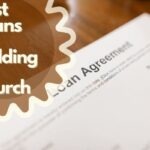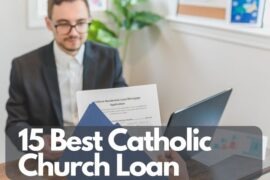When churches need funding to start a new project or maintain existing facilities, they often turn to Small Business Administration (SBA) loans. SBA loans are government-backed financing that can help churches access the capital they need to achieve their goals.
However, navigating the world of SBA loans can be complex, and churches must understand the requirements and eligibility criteria to secure funding successfully.
In this article, we will explore the ins and outs of SBA loans for churches, including the benefits of SBA loans, eligibility requirements, and how to apply for an SBA loan. By the end of this article, you’ll better understand how SBA loans can help your church thrive.
Contents
SBA Loans For Churches
The Small Business Administration (SBA) offers several loan programs for churches, which can help them finance various projects and operations.
Here are 15 SBA loans for churches and a brief explanation of each:
1. SBA 7(a) Loan
This loan program can be used for various purposes, including working capital, equipment purchases, and real estate acquisition.
2. SBA 504 Loan
This program is designed for financing real estate and equipment.
3. SBA Microloan
This program provides loans of up to $50,000 for small businesses, including churches.
4. SBA Community Advantage Loan
This loan program is designed to provide access to capital for underserved communities, including churches.
5. SBA Express Loan
This loan program offers expedited processing for loans of up to $350,000.
6. SBA Export Working Capital Loan
This program provides financing for small businesses, including churches, that are involved in export transactions.
7. SBA International Trade Loan
This program provides long-term financing to small businesses, including churches, that are involved in international trade.
8. SBA Veterans Advantage Loan
This loan program offers veteran-owned businesses, including churches, reduced fees and interest rates.
9. SBA Disaster Loan
This program provides low-interest loans to businesses, including churches, affected by a disaster.
10. SBA Small Loan Advantage
This program provides loans of up to $350,000 for small businesses, including churches.
11. SBA Women-Owned Small Business Loan
This loan program offers reduced fees and interest rates to women-owned businesses, including churches.
12. SBA Rural Business Loan
This program provides financing for businesses, including churches, in rural areas.
13. SBA Export Express Loan
This program offers expedited processing for loans of up to $500,000 for small businesses, including churches, involved in export transactions.
14. SBA CAPLine Program
This program finances businesses, including churches, with seasonal or cyclical cash flow needs.
15. SBA 8(a) Business Development Program
This program offers assistance to small businesses, including churches, that are owned by socially and economically disadvantaged individuals.
Overall, these SBA loan programs can give churches access to capital to help them achieve their financial goals.
It is important for churches to carefully review the requirements and eligibility criteria of each loan program and work with an experienced lender to determine the best option for their needs.
How To Apply For A SBA Loan (4 Easy Application Guide To Apply)
Here are the detailed steps on how to apply for an SBA loan:
1. Determine Your Eligibility
The first step in applying for an SBA loan is determining eligibility for your business. The SBA has specific criteria that businesses must meet, including being a for-profit entity, operating in the United States, and meeting certain size standards based on industry.
You can review the eligibility criteria on the SBA’s website or speak to an SBA representative to confirm your eligibility.
How To Determine Eligibility For SBA Church Loan
-
Understand The Lender’s Eligibility Requirements
The first step in checking your church loan eligibility is understanding the lender’s requirements. Each lender may have different eligibility criteria, such as minimum credit score, church size, years in operation, and financial stability.
Reviewing the lender’s website or contacting them directly to understand their eligibility requirements is important.
-
Gather Financial Documentation
Before applying for a loan, you must gather financial documentation demonstrating your church’s financial stability and ability to repay the loan.
This may include financial statements, tax returns, bank statements, and other financial records.
-
Assess Your Church’s Financial Health
You should assess your church’s financial health to determine if it is in a position to take on debt.
This includes analyzing your cash flow, debt-to-income ratio, and other financial metrics to determine if you can afford the loan payments.
-
Apply For Pre-approval
Some lenders may offer pre-approval, which allows you to determine your eligibility for a loan before submitting a full application.
Pre-approval may involve providing the lender with basic financial information and documentation for review.
-
Submit A Full Loan Application
If you meet the lender’s eligibility criteria and are pre-approved for a loan, you can then submit a full loan application.
This may involve providing additional financial documentation and information, such as a detailed project plan, cost estimates, and collateral information.
By following these steps, you can assess your church’s eligibility for a loan and determine which lenders may be a good fit for your financing needs.
2. Choose The Right Loan
The SBA offers several loan programs, each with different terms and requirements. You will need to choose the loan program that best meets the needs of your business.
The most popular SBA loan program is the 7(a) loan program, which can be used for various purposes, including working capital, equipment purchases, and real estate acquisition.
Other loan programs include the 504 loan program, which is specifically designed for real estate and equipment financing, and the microloan program, which provides loans of up to $50,000 for small businesses.
3. Gather The Required Documents
Once you have determined your eligibility and chosen the right loan program, you will need to gather the required documents for your loan application.
This will include financial statements, tax returns, and other supporting documentation demonstrating your business’s ability to repay the loan.
The SBA provides a list of required documents on its website, and you can also speak to an SBA representative to confirm what you need to provide.
4. Find A Lender
The next step is finding a lender participating in the SBA loan program. You can use the SBA’s Lender Match tool to find lenders in your area that offer SBA loans.
Once you have found a lender, you can submit your loan application and supporting documents for review, then wait for approval.
The SBA and the lender will review your application and supporting documents to determine if you qualify for the loan.
This process can take several weeks, so patience is important. If your loan application is approved, you will receive the funds, and you can use them to fund your business’s projects and operations.
Overall, applying for an SBA loan can be a complex process, but following these steps can increase your chances of being approved for a loan and achieving your business’s financial goals.
It is essential to carefully review the requirements of each loan program and work with an experienced lender who can guide you through the application process.
Benefits Of Applying For SBA Loans
1. Lower Interest Rates
SBA loans typically have lower interest rates than other types of loans, saving churches a significant amount of money in interest payments.
2. Longer Repayment Terms
SBA loans also typically have longer repayment terms, which can help churches better manage their cash flow and avoid defaulting on their loans.
3. Access To Capital
SBA loans can give churches access to the capital they need to fund important projects, such as building renovations or equipment purchases.
4. No Prepayment Penalties
Unlike some other loans, SBA loans typically do not have prepayment penalties, giving churches more flexibility in managing their debt.
5. Streamlined Application Process
The SBA has a streamlined application process for its loans, which can make it easier and faster for churches to obtain financing.
6. Low Down Payment Requirements
SBA loans typically have lower down payment requirements than other types of loans, making them more accessible for churches with limited resources.
7. Flexible Use Of Funds
SBA loans can be used for a variety of purposes, including working capital, equipment purchases, and real estate acquisitions.
8. Multiple Loan Programs
The SBA offers multiple loan programs, including the 7(a) loan program, which is designed to help small businesses and nonprofits.
9. Guaranteed By The Government
SBA loans are guaranteed by the federal government, which can provide added security for churches that may be hesitant to take on debt.
10. Opportunity To Establish Credit
By successfully repaying an SBA loan, churches can establish a positive credit history, which can help them obtain financing in the future.
11. Support For Local Economies
SBA loans can help support local economies by funding local businesses and nonprofits, including churches.
12. Access To Counseling And Training
The SBA provides counseling and training services to help churches and other small businesses better manage their finances and improve their chances of success.
13. Reduced Risk For Lenders
Because the government guarantees SBA loans, lenders may be more willing to lend to churches that they might otherwise consider risky.
14. Opportunity To Grow And Expand
By obtaining financing through an SBA loan, churches can have the resources to grow and expand their ministries.
15. Opportunity To Serve The Community
With the funding provided by an SBA loan, churches can expand their programs and services, which can help them better serve their communities.
Conclusion
Small Business Administration (SBA) loans can be an excellent financing option for churches looking to fund various projects and operations.
With a wide range of loan programs available, including the popular SBA 7(a) and 504 loan programs, churches can find a loan that meets their specific needs. It is important to carefully review each loan program’s eligibility criteria and requirements and work with an experienced lender to increase the chances of being approved.
By following the application process and providing the required documentation, churches can access the funds they need to achieve their financial goals. SBA loans offer low-interest rates, longer repayment terms, and other benefits, making them a cost-effective financing option for churches.
SBA loans allow churches to obtain the funding to grow, expand, and thrive.







